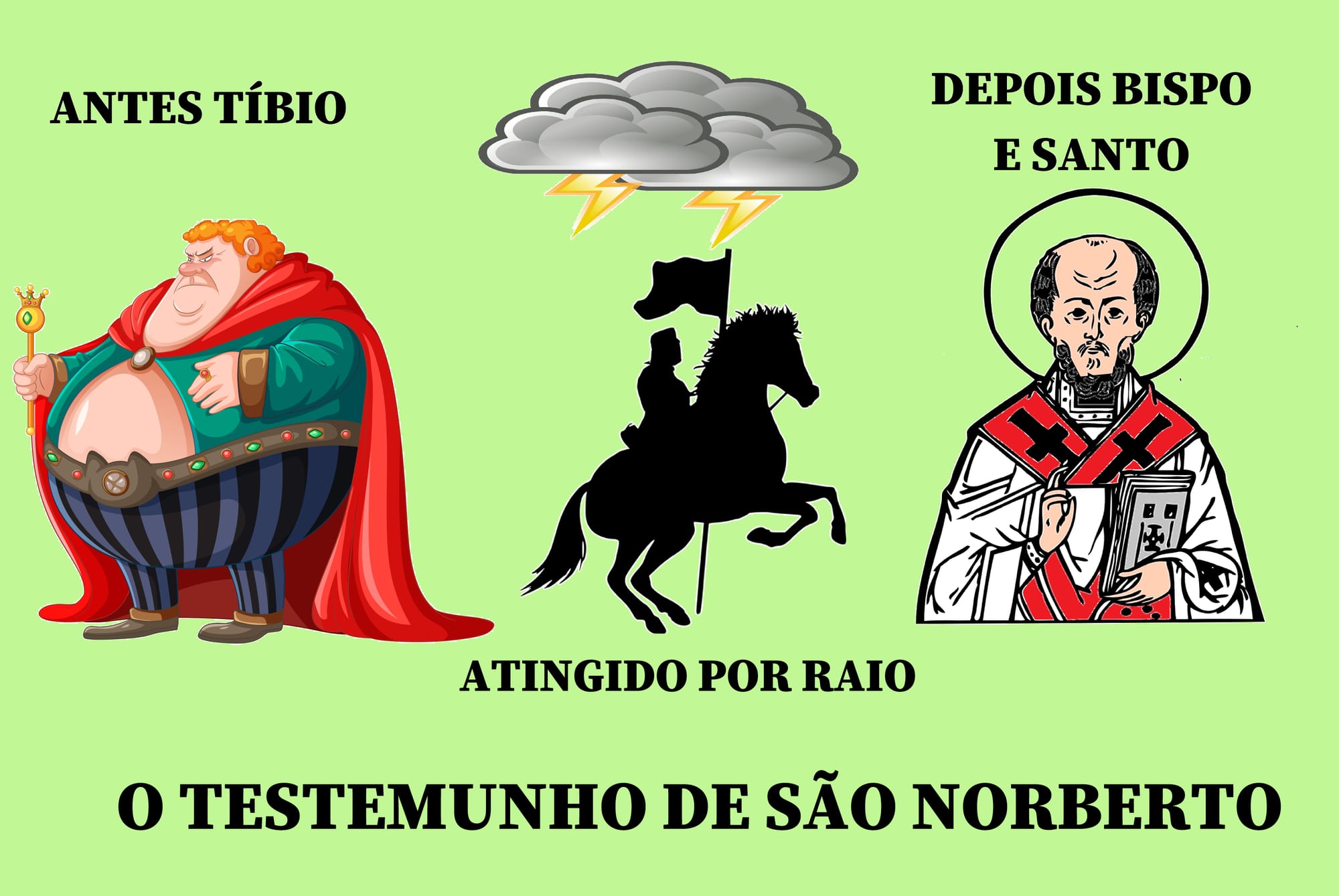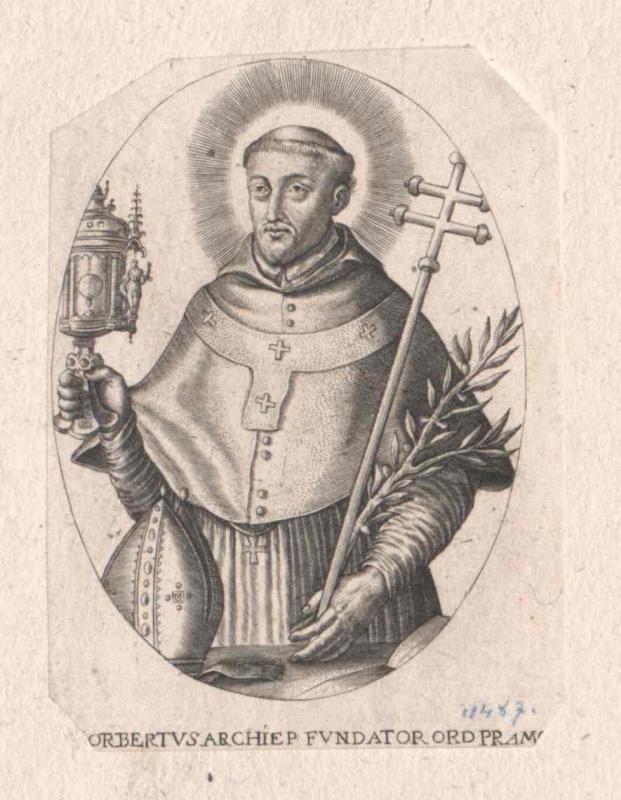Saint Norbert, Bishop: the testimony of a lukewarm man who was deeply converted after being struck by lightning and reformed the customs of the Middle Ages

Lukewarm is synonymous with one who is lukewarm, devoid of enthusiasm and zeal. Nowadays it is easy to find a lukewarm Christian, that is, one who believes in God and even attends the sacraments of the church but makes no effort to detach himself from his daily sins (even vices) (drunkenness, gossip, pornography, betrayal, pride, hostility to others, uncontrolled anger, etc. ). A soul like that thinks it's normal to wander between heaven and hell. But Father Michael Sopocko , rebukes the danger of this situation:
"Lukewarmness is a very dangerous state , since the soul remains in it in illusion , like the sick person who pretends to be healthy and does not seek a doctor. He considers the innumerable venial sins, in which he is often addicted, to be futile; and sometimes he also commits serious sins, with which he also gradually gets used, because they keep them in false security."
Today, therefore, we will report the testimony of a lukewarm religious of the Middle Ages, who had to face death in order to achieve a profound conversion and become one of the great saints who reformed the customs of the nobles and clergy of the Church of the Middle Ages, in the twelfth century.
The lukewarmness of subdeacon Norbert
Norbert was born near the beginning of the second millennium, in 1080, into a noble and very wealthy family in the north of present-day Germany. When entering adult life, he had to choose one of two paths, typical of the nobility of the time: military or ecclesiastical . Even without any religious vocation, he opted for the second, to become a subdeacon. For one simple reason: the life he would receive at the court of the Prince and Emperor Henry V would be the best possible.
And so it really happened: he led his life as a subdeacon through large and refined banquets from court to court , to the pleasures of courtship, in the fine elegance of clothing and hunting. In short: he became a cleric of worldly life from the feudal era, even common to find in the period. But God's designs for him within His church were other and very important, his life needed to change...
Storm and lightning strike
He was riding in the middle of a storm, he had no way of escaping, he could only accelerate his gallop as much as possible. But there was no time: lightning strikes him , killing his horse and throwing him far away. He was unconscious for just over an hour. Upon waking up, he had the deepest reflection of his life: he realized that if he didn't abandon his sinful life of addictions, he wouldn't save his soul.
It is important at this point to highlight your options. He could have got up, gone back to his court, received the most zealous medical care, and then reentered his riotous life. But he realized in that life-and-death situation: what if I had died? What am I doing right in my life? By his own free will he decided to change his life. God didn't force him , he just allowed a situation that gave him a deep reflection.
Still in the place, when he wakes up, he asks God: "Lord, what do you want me to do?" . Then he receives and listens to a clear and strong answer from God: "Abandon the path of evil and do good".
Norberto's reflection is up to all of us on a daily basis: if I died today, would I go to heaven with the life I've been leading? Would my soul be saved? You cannot leave for tomorrow the conversion that can be done today, even now!
Norbert's deep conversion
It was the turning point in his life. In the same way that he was deep in vices, he decided to make a conversion in the same proportion, redirecting his life in the opposite way to which he was.
Immediately dropped his mediocre life of vices, but not only... he got rid of his castle, donated his assets to the poor, dropped the fine clothes and started to wear poor people's clothes. He was left with just a donkey and a few utensils needed to celebrate Mass daily wherever he went - including the monstrance to honorably conduct the Eucharist, which only much later would be widely used in churches around the world.
The monstrance then began to compose the paintings of pictures depicting Saint Norbert, as well as his great devotion to the Eucharist - which granted him the title of Apostle of the Eucharist.
He spent long years in penance, in addition to studying theology at the Siegburg Monastery , eventually becoming a priest. But his calling was for pilgrimage , always on foot and barefoot, even getting a special approval from Pope Gelasius II to be itinerant (it was not common at the time). He preached the gospel in France, Belgium and Germany, always with the example of an austere life and reporting his testimony of deep conversion, attracting many followers:
"I frequented the courts of princes and riches abounded in me, I spared no pleasure. But you are certain, my brothers, that the greatest abundance of goods in this world resides in poverty of spirit. I only became rich when I lacked goods, because the moment I When I expelled from my heart the desires for earthly goods, it was filled with the goods of glory, far better, without comparison...
Thus, he founded the Order of Premonstratenses (or called white monks) - under the rules of life and conduct of St. ). His popularity accumulated to such an extent that in 1126 the population acclaimed him as successor to the Bishop of Magdeburg . During this period, he fought a schism in the church and was adviser and chancellor to the German King Lothair III.
The reform of customs
He was a great pioneer of his time by frontally fighting the privileges of the clergy and nobles, in which many maintained a Christianity of appearances. Through his strong preaching many of these returned to the true faith and the ways of the simple and humble gospel. His efforts in a reformist spirit, as well as the contents of his preaching, reached the attention of the Pope. This gave him broad support, enabling Norberto to become a reformer of the customs of the twelfth-century church of Christ (as well as St. Bernard). In 1532 he was canonized by Pope Gregory VIII. There are numerous monasteries with more than 1,200 monks of the order of São Norberto spread around the world until the present day, including Brazil.
Prayers to Saint Norbert
If you find yourself in a lukewarm situation and need strength to get out of it, or even if you have a relative or colleague in this situation, pray to St. Norbert:
Prayer 1 : "O God, who made Saint Norbert a faithful minister of your Church, through prayer and pastoral zeal, grant us, through his prayers and merits, to achieve one day, with your grace, the realization of everything you taught us by word and example. Through our Lord Jesus Christ Your Son, in the unity of the Holy Spirit, Amen."
Prayer 2 : “Great bishop and shepherd of souls, help us to live the sacraments with sincerity and truth, having the Eucharist as the center of our lives. May Jesus be more loved and adored every day, and may we be his faithful followers. Amen! Saint Norbert, pray for us!"
References: Padre Bráulio D'Alessandro, Padre Alex Nogueira, Arquidiocese de São Paulo, Paulus, Canção Nova (a), Canção Nova (b), Comunidade Mar Adentro, A Palavra Viva de Deus, Infopedia, Europeana
